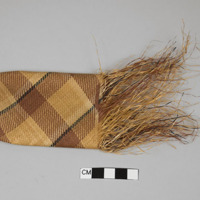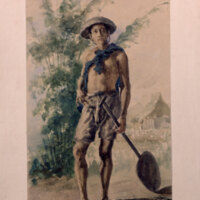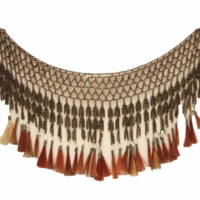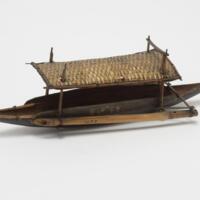Cigar Case
Text
Share this
Media
Images
Map National Anthropology Museum Madrid
Metadata
Publisher
National Anthropology Museum Madrid
Date
19th century
Identifier
CE2501
Origin
Pampango, Central Luzon, Philippines
Connection to Philippines
Pampango origin
Materials
brown bamboo
technique: carved
technique: carved
Physical Dimensions
height: 27cm
diameter: 11.30cm
diameter: 11.30cm
Provenance
Brought over for an exhibition on the Philippines, Mariana Islands, and Caroline Islands in Madrid in 1887.
Type: Smoking equipment
Type: Smoking equipment
Acquisition Date
1887
Short description
Tobacco box carved in bamboo with scenes of daily life. Tobacco was introduced to the Philippines by the Spanish in the seventeenth century and its consumption soon spread to the entire population, without distinction of age or sex, also being used as a medicinal resource against many diseases. It was not part of religious ceremonies, but it was an important social activity. It is smoked in cigars or in a pipe at any time of the day, it is also drunk, inhaled, sucked or chewed.
Acknowledgements
photo by Miguel Angel Otero
Official Website
Collection
Cite this Page
“Cigar Case,” Mapping Philippine Material Culture, accessed April 19, 2024, https://philippinestudies.uk/mapping/items/show/2536.
Geolocation
Sensitive Content
Mapping Philippine Material Culture collates digital material from institutions, and some of this material is inherently colonial and contains words, terms and phrases that are inaccurate, derogatory and harmful towards Filipino and Filipino diasporic communities. Catalogue transcriptions, book titles, exhibition titles and museum titles may contain harmful terms. We recognise the potential for the material to cause physical and mental distress as well as evoke strong emotions. Owing to the scale of the collection’s data, a process to implement sensitive-content warnings in the displayed data is still incomplete. The material within the catalogue does not represent Mapping Philippine Material Culture’s views. Mapping Philippine Material Culture maintains a strong anti-colonial, anti-racist position and affirms its support for centring the humanity of historically marginalised and disenfranchised communities.
Facebook Twitter



